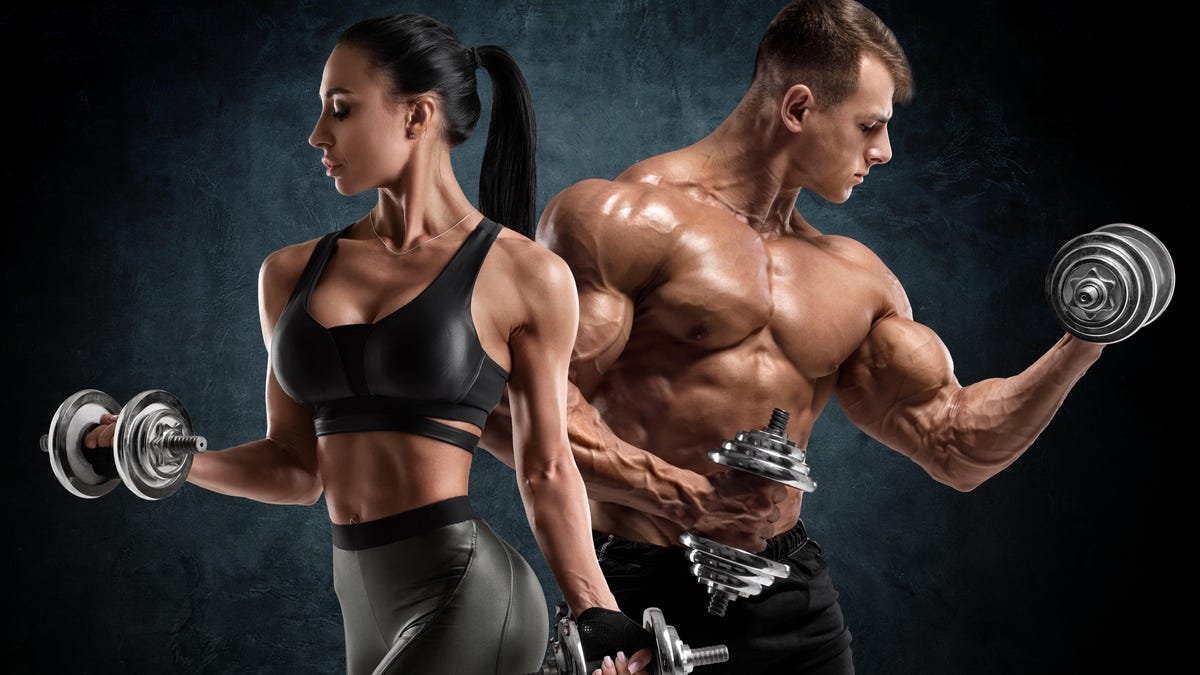
The best and the worst thing about social media is that it lets us compare ourselves to others. When it comes to athletes and fitness influencers, those comparisons can inspire us. But what happens when somebody tells you you’re a fool for idolizing (fill in any name here), because they’re obviously on steroids? Does that change how you feel about their accomplishments? More importantly, does it change how you feel about yourself?
This is a social media rabbit hole you can slide down forever: watching video after video investigating whether famous people are “natty or not” (natty meaning natural) and arguing on Reddit about what you learned. The people who get most worked up about an influencer’s alleged steroid use often say they’re doing it to protect others from the harms of the drugs, and to temper beginners’ expectations about what is possible without drugs. I think the opposite is true: obsessing over whether others are on gear is likely to do you more harm than good. Let me explain.
What are “realistic expectations,” anyway?
If you’re lifting weights with a plan of gaining either strength or visible muscle—or both—you probably want some way to gauge where you are on that journey, and what might await you in the future. Some people say you should only compare yourself to your past self, but there is such a thing as being inspired by others. Imagine telling a musician not to listen to musicians who are better than them, or telling a writer not to read good writing. I have my own personal list of athletes and influencers who inspire me, most of them women my size who lift mind-boggling weights.
Are some of them taking steroids? Maybe. It’s possible. High-profile athletes get popped all the time. But on the other hand, there are plenty of people who get accused of using performance-enhancing drugs (PEDs) when they haven’t, like Stacy Burr, a powerlifter who spoke about her drug use on the Empowered by Iron podcast. She says she was constantly accused of using PEDs for years before she ever decided to start taking them.
Or, for a historical example, look at people like Eugen Sandow and Miriam “Vulcana” Williams, who had strong(wo)man careers at a time when steroids did not exist as a performance-enhancing drug. People with that same amount of muscle (or less!) routinely get accused of drug use in natty-or-not discussions online.
G/O Media may get a commission
The problem with “natty or not” videos
Let’s forget about muscly influencers for a minute, and look at the influencers who make video after video (or encourage discussion after discussion) about whether such-and-such person is on gear or not. It’s important to know that these accusations are hugely popular content and they are created as content. If you click and/or argue, you’re part of somebody else’s moneymaking scheme. These videos don’t exist to educate you, they exist because it’s a thing people like to yell about on the internet.
It’s true that plenty of athletes and fitness models are on PEDs. But it’s not like you can know just by looking. If it were, the World Anti-Doping Agency would get rid of the urine tests and just hire a bunch of YouTubers with expert eyeballs to look at athletes and declare whether they’re doping or not.
What really happens, in the making of this content, is that the natty-or-not crowd will look at anybody with an above-average physique or results and declare that person must be on steroids. Some of the things that will get you a chorus of steroid accusations on the internet:
- competing in Crossfit
- competing in powerlifting
- having noticeably large deltoids (shoulder muscles) or traps (the muscles at the sides of your neck)
- taking before-and-after photos where the lighting is better in the “after” shot
- having any muscle at all while being a woman
It quickly becomes an echo chamber with zero relationship to reality. An influencer only has to say (or hint) that somebody is on gear and that they believe this because of X observation, for their followers to parrot the line amongst themselves. It’s not like they’re guessing who is on gear and then having the answer revealed, and admitting who is and who is not; it’s just a constant stream of accusations as the influencer and their followers become more and more convinced of the truth of rumors they themselves made up.
There are influencers and athletes who are on gear and who talk about it openly, but many of them are in countries other than the U.S., due to our drug laws. It’s a catch-22 if someone is not on gear, though: They either deny it and are seen as doubling down, or they ignore the accusation and are seen as guilty for their lack of response.
Why all of this is a waste of time
Okay, so you’ll never know for sure if your favorite athlete or influencer uses steroids (unless they come out and tell you), and it’s not exactly a secret that many of them are using. So what’s the harm in speculating?
Here’s the thing: It’s true that steroids help you to grow more muscle, but there are plenty of athletes who are able to grow a lot of muscle without drugs. Anyone at the top of their sport is likely to have good genetics and a long training history, whether they add to that with steroids or not. (For a realistic look at how much strength and muscle a person can really gain with steroids, there’s a science-based breakdown here.) It’s like pointing out that a basketball player is tall when she’s wearing high heels. So what? If she took off the heels, she’d still be tall, and she’d still be better at basketball than the rest of us.
The real end game of the natty-or-not obsession is not obtaining a realistic sense of expectations, shrugging, and walking into the gym to focus on yourself. No, it leads to further warping your own expectations of what is possible. Maybe this is just me spending too much time on Reddit, but I feel like there’s a pretty strong correlation between the people who care the most about calling out “fake natties” are the people who have the least experience in the gym (and pretty weak lifts).
A few steps of telephone away, you find the people who heard from somebody who heard from somebody that most influencers and celebrities are on steroids. They say that you need gear to look like Brad Pitt in Fight Club, or Lean Beef Patty. They do look amazing, I agree, but neither has an amount of muscle that would require steroids to achieve. If you have grown conditioned to look at somebody with a moderate amount of muscle and feel dejected—like you can’t possibly achieve that size without steroids, so you might as well give up—I would argue yours are the truly unrealistic expectations.
Credit: Source link



